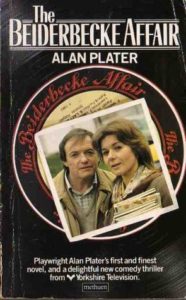Decades: Compiling the Ultimate Library with Ian Moore
January 2021: when I set the path of my Thursday evenings for the next 14 months (and counting). You see, every Thursday evening I make myself a mug of hot coffee and I prepare to introduce my next guest to the Decades Library.
What is the Decades Library? I always hope you ask as it means you are a new visitor and new visitors are always welcome. All those months ago I was pondering the question “If I had to fill a brand new library with nothing but the very best books, which books would I put on the shelves?”
I realised this was not a question I could not answer alone so each week I am joined by a new guest and I ask them which books they would add to my Decades Library. My guests are all invited to choose five books but I ask that they follow two rules when making their nominations:
Rule 1 – Choose Any Five Books
Rule 2 – You May Only Choose One Book Per Decade From Five Consecutive Decades.
Easy!
This week I am delighted to welcome Ian Moore to Grab This Book. Ian’s book C’est Modnifique! was the first book I added to my Audible Library waaay back in 2014 when I branched out into new ways to enjoy reading. I have long been a fan of his contributions to Radio Five’s Fighting Talk and his latest novel Death and Croissants was the book I bought myself for Christmas!
Ian Moore has been one of the UK’s leading stand-up comedians for the last 20 years. In 2021, Death and Croissants was published by Farrago Books, the first in the Follet Valley series of French-set cosy mysteries involving an Anglo-French amateur detective duo. Described as ‘Bloody Funny’ by Alan Carr, Death and Croissants has become a best-seller (number one in Bird Care (!) for 7 months) and has been optioned for television. The paperback is out in April and the second in the series, Death and Fromage, is out in July 2022.
DECADES
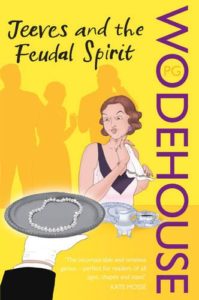 1950s – Jeeves and the Feudal Spirit – PG Wodehouse
1950s – Jeeves and the Feudal Spirit – PG Wodehouse
It always comes back to Wodehouse. The writing, the characters, the humour… whenever I feel down, I return to Pelham Grenville. It’s not a world I should necessarily be interested in, I have no connection with pre-war Bright Young Things or the aristocracy or country houses or omniscient gentlemens’ gentlemen but Wodehouse more than humanises his ‘targets’, if you will, he makes you care for them. I actually feel Bertie Wooster has been hard done by through the ages; he’s become the very epitome of upper class twittery, whereas I see him more as a gentle, giving soul always there for a friend and the victim of other’s whims and machinations. This collection has all the great characters Roderick Spode, Aunt Dahlia, Florence Craye and it all begins over a slight disagreement about facial furniture.
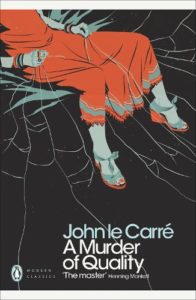 1960s – A Murder of Quality – John Le Carré
1960s – A Murder of Quality – John Le Carré
This was Le Carré’s second George Smiley book and the only one that wasn’t directly about espionage. This is a more straightforward murder investigation which Smiley takes an interest in on behalf of an old friend, when the wife of a schoolmaster is beaten to death at the fictional public school of Carne. Though in many ways it’s a straightforward whodunnit, it has all the claustrophobia and downbeat atmosphere of Smiley’s more famous outings. So beautifully written, it’s another book I return to often, an absolute masterpiece of plotting and characterisation with melancholic ‘toad’ Smiley always humane and at the heart of it all.
PS I would highly recommend the Radio 4 George Smiley dramatisations with Simon Russell Beale. Peerless radio.
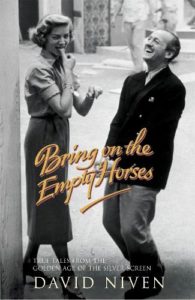 1970s – Bring On the Empty Horses – David Niven
1970s – Bring On the Empty Horses – David Niven
This is probably the one book I have read more often than any other. David Niven’s tales and anecdotes of the Golden Age of Hollywood, all the famous stars of the time seen through Niven’s raconteur eyes. It’s such a joy to be transported to that era, and yes, I know it’s glossy and one only hears the positives (mostly) of an era and society that was actually rather vicious, but I don’t care. It inspired me as a child, and I still think I was born in the wrong era. If only I’d tipped up in Hollywood in the early 1930s as a young man, with a pencil moustache…
1980s – The Beiderbecke Affair – Alan Plater
Alan Plater’s first book in The Beiderbecke Trilogy is another chosen for its calming influences. Plater said he wrote about characters whose normal lives are interrupted when the outside world barges in, and on the face of it, Trevor Chaplin and Jill Swinburne seem completely unsuited for the convoluted jazz-themed mystery that they’re drawn into. But the dialogue and, in opposite to Wodehouse, the sheer mundanity of their world, is just so perfectly pitched. It’s been a big inspiration to me in my Follet Valley Series, and the TV series is as charming as television gets.
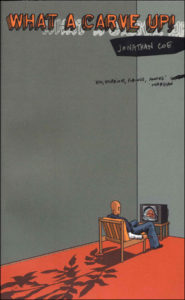 1990s – What a Carve Up! – Jonathan Coe
1990s – What a Carve Up! – Jonathan Coe
I read What a Carve Up! when it first came out in 1994, drawn to it because it had Shirley Eaton on the cover and that appealed to my film obsession, but it became the first book that left me terribly angry and helpless about the state of the world. It also left me bereft because I thought that no matter what I read from now on, and for the next (hopefully) 60 years of my life, nothing would come close to the sheer majesty of the work. It’s fragmented in style, structure and voice which contributes to the story of the dizzying grip on power that just a few people can have and so it’s as much horror as it is satire. If you don’t know, it’s about how Britain has been carved up so that the same names run government, agriculture, industry, health, arms, and the media. It’s a work of fiction obviously, it could never really happen…
HOW DID I ARRIVE AT THESE CHOICES? Well I started with What a Carve Up! and worked around that. My second favourite book, Birdsong, was published in the same decade and it seems a pity to have left that out, but I’ll be surprised if someone else doesn’t choose it. I had to have Wodehouse in their somewhere, and David Niven has influenced more as a person and a writer than anyone else I can think of. A couple of notable omissions are Catch-22, The Last Exit of Sherlock Holmes by Michael Dibdin and Halliwell’s Filmgoers Companion. Also, now I look at the list see how they have all, in their way, had an influence on my writing style or general demeanour!
Huge thanks to Ian for these brilliant selections. There have not been many non-fiction titles recommended thus far and David Niven is definately bringing some glitz to proceedings. This is also the first selection for many months where I haven’t read a single one of the books recommended. I really must put that right – and soon.
DECADES WILL RETURN

